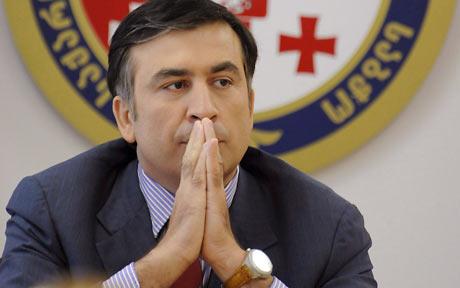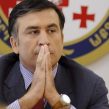
Why Did President Saakashvili Agree to Become a ‘Lame Duck?’
Publication: Eurasia Daily Monitor Volume: 10 Issue: 57
By:

On March 25, Georgia’s parliament voted in favor of constitutional amendments that significantly reduce the president’s powers to influence domestic and foreign policy (https://www.civil.ge/eng/article.php?id=25887). According to the amendments, the president will have no right to dismiss the government without parliament’s consent. Currently, the Georgian Dream coalition headed by Prime Minister Bidzina Ivanishvili holds an absolute majority in the parliament. Prior to the constitutional amendments, the Georgian president had the right to sack the government of the country at any time. If the parliament did not agree to the president’s decision, the head of state could disband the legislature itself and appoint a provisional government ahead of early elections.
But with the passage of the changes to the constitution, regardless of his criticism for Ivanishvili’s domestic and foreign policy, Mikheil Saakashvili will have no legal instruments to influence the government’s decisions. At the same time, however, the president will no longer bear any responsibility for any missteps Ivanishvili’s government’s makes.
With his reduced constitutional role and looming presidential elections scheduled for October 2013, President Saakashvili can now politically be considered a “lame duck” (https://ria.ru/world/20121102/908967445.html#13640187404353&message=resize&relto=register&action=addClass&value=registration). “President Saakashvili stated on multiple occasions that he did not intend to sack Ivanishvili’s government, but the prime minister could not cope with his fears,” David Darchiashvili, a member of parliament from the opposition United National Movement (UNM), told Jamestown.
Yet, the head of the governing cabinet possibly had other considerations on his mind when he pushed for the constitutional amendment changes. First, by stripping the president of the power to sack the government, Ivanishvili sent a clear message to the central and regional state bureaucracies, which could not figure out the intricacies of the complicated process of “co-habitation.” The bureaucracies tried to maintain their loyalty to both leaders at the same time, resulting in poor policy cohesiveness among the middle- and lower-ranked civil servants. This was observed also in the police, the army and even in the judicial system (https://www.civil.ge/eng/article.php?id=25881), which has traditionally been highly susceptible to executive branch dictates—as in most post-Soviet countries. But Ivanishvili’s successful curbing of presidential powers finally signaled to every army and police officer, tax official and judge that President Saakashvili has only formal authority, while the real instruments of power and resources are concentrated in the hands of the prime minister—the actual leader of the country. Previously, the parliament also decided that such critically important governmental bodies as the foreign intelligence service as well as the service of state security that includes personal guards for the head state should be under the prime minister’s control (see EDM, March 4).
Ivanishvili’s second consideration was likely that with President Saakashvili marginalized as a “lame duck,” Georgia’s foreign partners will unquestionably know who to talk to in Tbilisi about international affairs and bilateral relations (see EDM, February 21). This message is especially important for Moscow, which all along has been skeptical of the “co-habitation” of the president and the prime minister. Moscow has repeatedly signaled that as long as Mikheil Saakashvili can have any impact on important governmental decisions, Russia will abstain from attempting to resolve any concrete issues in Russian-Georgian bilateral relations. In other words, until Saakashvili loses access to all levers of power, Moscow is unwilling to engage in anything other than rhetoric or inconclusive meetings of Russian and Georgian diplomats (https://www.civil.ge/eng/article.php?id=25805).
Domestically, the recently passed constitutional amendments have completely shifted the balance of power between the president and prime minister. But why have Saakashvili and his supporters agreed to these changes? Beyond any doubt, without the support of the United National Movement, the ruling coalition would not have been able to alter the constitution. The preliminary vote (https://www.civil.ge/eng/article.php?id=25873) showed that only 93 members of the parliament out of 150 supported Prime Minister Ivanishvili’s proposals, while a minimum of 100 parliamentary votes were needed to make the changes. So if President Saakashvili’s backers had chosen to withdraw their support, the constitutional changes would have had no chance of passing.
Saakashvili himself had asked UNM parliamentarians to support the amendments. Just like the prime minister, the president arguably also had his own reasons for backing the constitutional changes. First of all, Saakashvili intended to demonstrate that the ruling Georgian Dream coalition would not be able to make big decisions without his party’s political input. “The president sacrificed his executive powers for the party’s public standing, in order to enable the United National Movement to remain a powerful actor even beyond the presidential elections,” blogger for the GHN informational agency Nika Imnaishvili noted in an interview with Jamestown. At the same time, “Saakashvili realized perfectly well that he would not be able to actually use his formal powers to sack the government because if he decided to do so, he would have been overthrown through a revolution,” Georgy Khukhashvili, one of the closest aides to Prime Minister Ivanishvili, told Jamestown.
Another reason for the President’s decision to pass on power to the cabinet is linked to the fact that the Georgian Dream government started to encounter difficulties in delivering on Ivanishvili’s lavish electoral promises. “[Ivanishvili] keeps saying that he cannot deliver on his social program promises because my powers obstruct his efforts,” President Saakashvili said in an interview for TV channel Imedi on March 22. Saakashvili expressed his confidence that, having retained his party’s prestige as an influential political power, he would be able to remain in Georgian politics as the leader of United National Movement. “Only recently I was thinking about appropriateness of leaving politics, but now it would amount to fleeing,” the President said.
The main consequence of the constitutional amendments is, thus, the “rebirth” of the United National Movement. “In the past months, the authorities tried to eliminate our party [UNM], but in the end they [the Georgian Dream coalition] were forced to admit that they cannot comprise a constitutional majority in the parliament. Only after this acknowledgement, we voted for the amendments,” a member of parliament from the presidential party, Khatuna Gogorishvili, noted in a conversation with Jamestown.
Although President Saakashvili has politically become a “lame duck,” his party has demonstrated solidarity in parliament and retained the chance to propose a serious contender to Georgian Dream for the upcoming presidential elections in October. Consequently, the recently passed constitutional amendments have signaled the start of the presidential race in Georgia.




